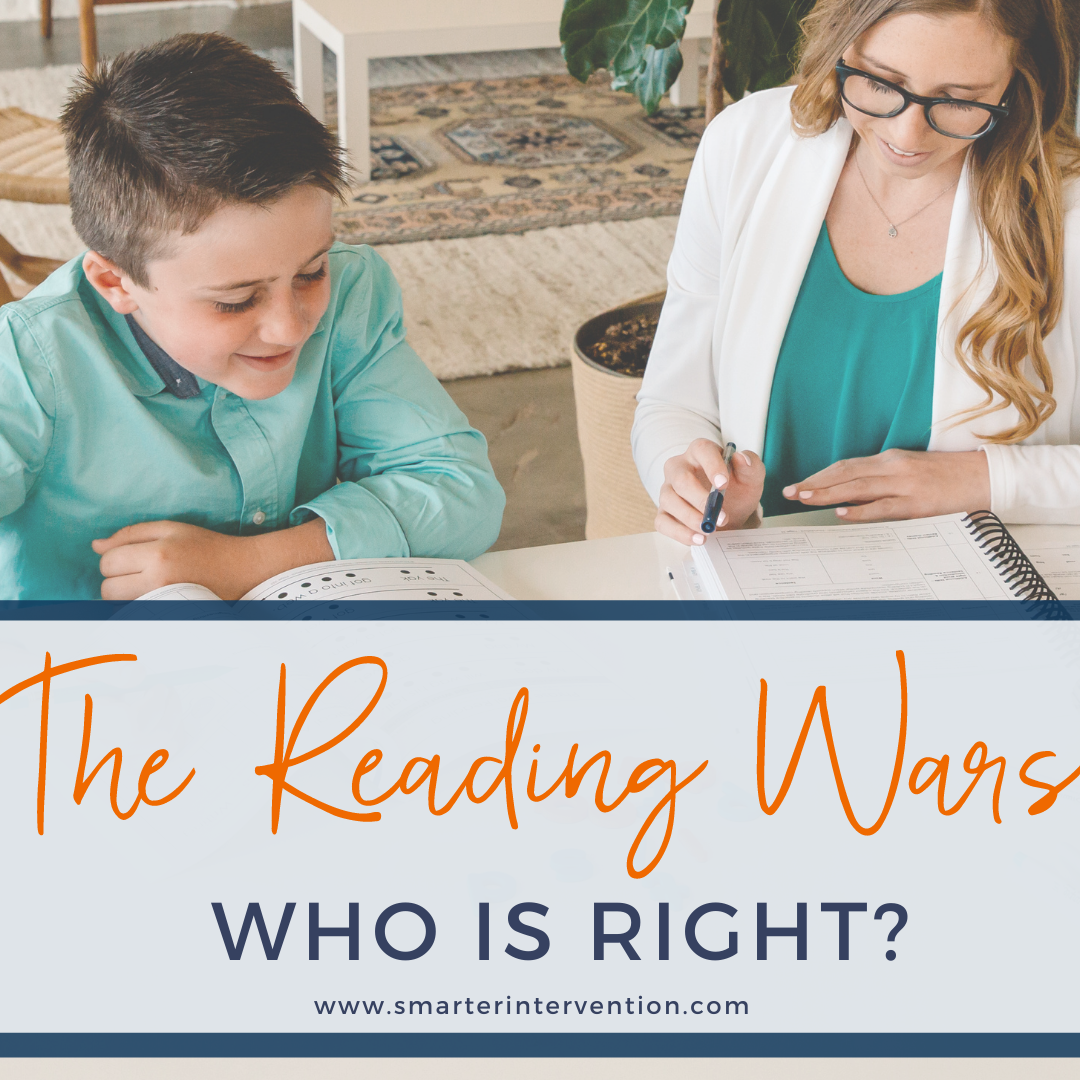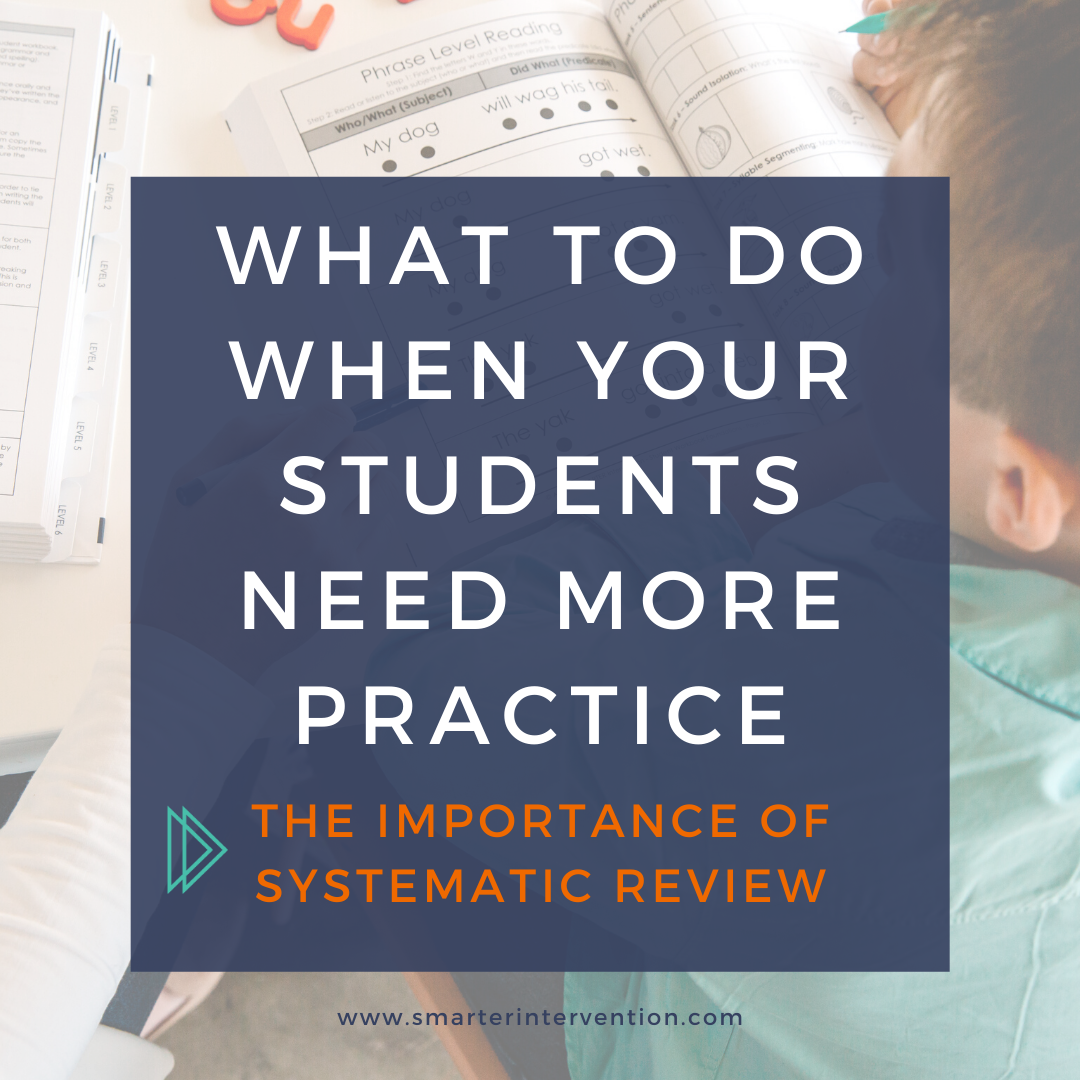Science-based literacy resources and articles
for families, educators and schools
Search by Category:
Categories
- Advocacy
- Authentic Literature
- Business
- Classroom Strategies
- Comprehension
- Data Tracking
- Differentiation
- Dyslexia
- Evaluation and Assessment
- Executive Functioning
- Games & Activities
- Helping My Child At Home
- How To
- IEP/504 Plan
- Lesson Planning
- Math
- Online Intervention
- Organization
- Parents
- Phonics
- Phonological Awareness
- Reading Comprehension
- Reading Fluency
- Research
- SLP
- Spelling
- Vocabulary
- Writing
Instead of saying, "The research says..."
How many times have you heard someone (or yourself) say, "but the research says [insert an excerpt from an article here]" to validate an approach or strategy?
We get this, it's entirely well-intentioned and honestly good in many ways BUT there's a better way to validate our approach and strategy in our literacy instruction.
Instead of using "the research says…" we should be using our own experiences, our own students, and our data to be driving us. Keep reading to learn more.
Teaching Reading is NOT Rocket Science
We're going to share a potentially unpopular opinion...
Teaching reading IS NOT rocket science.
While this is a popular expression, we’ve seen it impact the literacy field in a negative way. Keep reading to learn more about the problems with saying "teaching reading is rocket science.”
The Reading Wars - Who is Right?
Raise your hand if you’ve ever heard of the reading wars.
This “battle” has been a long-standing argument between whole-language and phonics-based instruction. Over the last few decades (as more research has been done as a part of the Science of Reading movement), we have seen the pendulum swing back and forth and back again between these two reading approaches.
So… how do we know which is "right?" Keep reading to learn more about these two approaches and which is a fit for your students.
How to Use SOR to Support Students Who Struggle with Word Recognition & Comprehension
We’re so glad you’re here. Now over the last month, we’ve been talking all about how to use the Science of Reading and effective reading instruction strategies to support students with varying needs. We’ve talked about supporting students who are reading on grade level, supporting students who struggle with decoding and word recognition, we’ve talked about supporting students who struggle with comprehension, and today we’re going to talk about our last group of students, students who struggle with word recognition and comprehension. Click through to learn more!
How to Use SOR to Build Students’ Comprehension Skills
In order to be a successful reader, students have to be able to understand what they are reading - not just sound out the words. Keep reading to learn how to use SOR to support students that struggle with comprehension.
How to Use SOR to Support Students with Poor Word Recognition
This week, we are taking a look at how we can best support students who struggle with word recognition (or sounding words out for reading & spelling).
Research tells us that between 70-80% of students who are struggling with reading specifically struggle with word recognition. In order for these students to read effectively, it is critical that we are able to teach them how to decode and encode. Keep reading to learn how we support this group of students and grab some of our favorite resources!
How to Support On Grade Level Students (and above) Using the Science of Reading
Today we are jumping in and discussing how SOR strategies can support students who read on (or above) grade level.
Now, if you are working as a reading interventionist or SPED teacher, you may not see these students often as they don’t appear to need a lot of additional support when it comes to reading. This doesn’t mean, however, that there aren’t ways we can support these children to help them unlock their highest potential. Keep reading to learn how SOR strategies can support these students!
Time Spent Testing My Students is Taking Away From Instruction Time (or is it?)
It can absolutely feel like all the time we spend evaluating could be better spent actually TEACHING our students the skills, right?
But the truth is - it is a critical component of our instruction.
While we are just as eager to jump into concepts with our students and get them the instruction we KNOW they will need, we have to recognize that assessments and data should be providing us incredibly valuable information that sets the trajectory for where we need to go.
The One Thing You Can't Leave Out in Reading Intervention
We’ve been at this for a while now! We’ve worked with hundreds of struggling students in a variety of different settings and one of the most important things we’ve learned is that students DO NOT struggle with reading for the same reasons!
And this is SO important to recognize, because if we don’t recognize this, then we try to support struggling readers using all the same strategies, and the bottom line is that just doesn’t work. For many reasons, but most importantly because in order to support ALL struggling readers, we need to know WHY they’re struggling to read!
How to Support Struggling Readers Based on the Science of Reading
In a 2019 study conducted by the National Center for Education Statistics, it was determined that over 66% of 4th graders were not reading at a proficient level. Part of this is because of the gap that exists between research-based practices and what’s being implemented in the classroom. Unfortunately many large curriculum publishers adopted by schools were not staying current with the ever-expanding body of research on the cognitive development of students.
In order to close this gap, we need to implement practices in the classroom that align with the Science of Reading. Check out this blog for ideas that you can use to support your students!
Should We Be Using Decodable or Non-controlled Texts For Our Fluency and Comprehension Instruction?
When we think about reading instruction, there are a few different style texts that we can use to support fluency and comprehension. Often, we hear about things like decodable texts, predictable readers, controlled vocabulary readers, language experience stories, authentic literature, and noncontrolled texts.
With so many different styles, it can be challenging to know which to use when. There are champions for many different styles and you may have heard pros and cons for one style versus another. Today, we are going to take a look at two of the styles we hear about most often - decodable vs. non-controlled text.
How to Build Fluency & Comprehension at the Passage Level
When working with students, our end goal is always that they can functionally read and write. A big part of this is the ability to read at the passage level and derive meaning from the text.
Luckily - building fluency and comprehension at the passage level doesn’t have to be hard. Keep reading to learn how you can incorporate this instruction into your reading lessons!
How to Make Reading Lessons More Engaging
Have you ever thought to yourself - how in the world can I make this more engaging for my students?
If so, you are definitely not alone. Reading intervention is HARD for our students. We are asking them to complete tasks that have always felt difficult for them.
The good news - it’s easier than you might think to make lessons engaging for your students. Plus - when students are engaged, it’s more likely that they will learn the material. It’s a win-win!
How to Build Fluency & Comprehension with Sentence Reading
There are a lot of misconceptions when it comes to reading fluency and comprehension, including the fact that it is difficult to support, means that students need to be reading faster, and is reserved for when they can read at the passage level. Today - we are breaking down these misconceptions and discussing how you can use sentence-reading to help build your students’ fluency & comprehension skills!
How to Fit Vocabulary in to Your Reading & Writing Lessons
Vocabulary instruction is necessary in order for phonics to matter. Keep reading to learn how you can easily & effectively incorporate vocabulary instruction into your reading & writing lessons.
How to Get the Most Out of Your Literacy Lessons
Have you ever thought to yourself - “How in the world am I EVER going to fit everything into my lessons?!” or maybe, “How can I better support my students?”
We certainly have!
The great news - we can actually make our interventions lessons MORE effective WITHOUT adding a ton of additional time. Keep reading to learn how!
How To Explicitly Teach Phonics Rules
It’s no secret that research tells us we need to teach rules explicitly - but what exactly does that mean?
Today, we are going to break down exactly what “teaching rules explicitly” means as well as walk you through how you can use this approach in your lessons!
What To Do When Your Students Need More Practice: The Importance of Systematic Review
Have you ever looked through your students’ lesson data and thought - “gosh, they just aren’t getting this?”
We’ve all been there. Today - we are going to break down what you can do when students need more practice and the importance of systematically reviewing previously learned concepts.



















